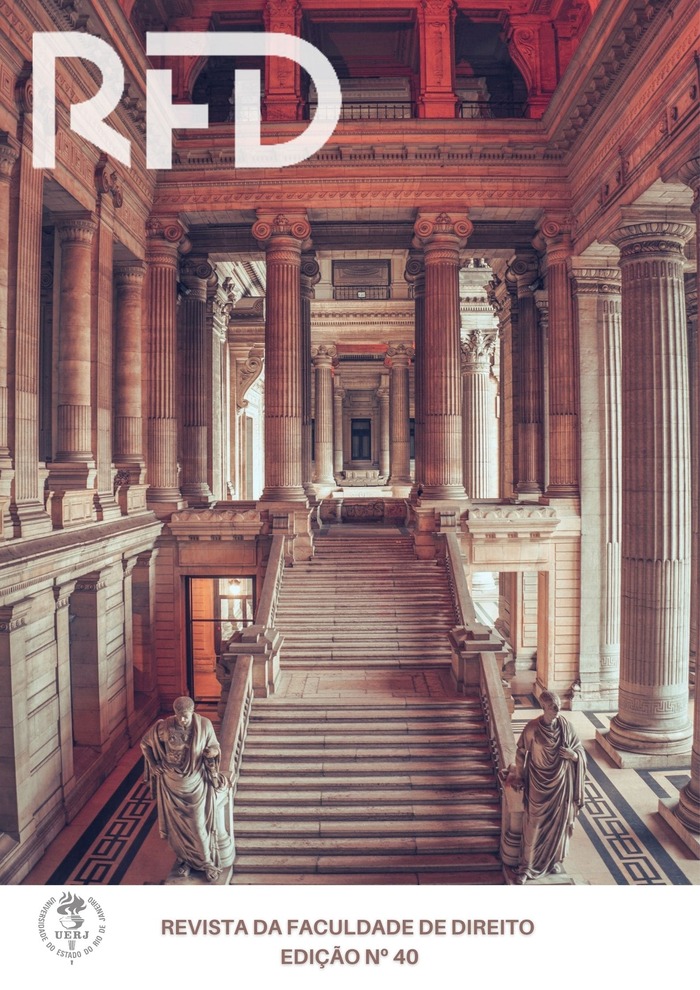A INCORPORAÇÃO DO ESTATUTO DE ROMA NO DIREITO BRASILEIRO E O APARENTE CONFLITO COM AS NORMAS CONSTITUCIONAIS: DA PRISÃO PERPÉTUA E ENTREGA DE NACIONAIS
DOI:
https://doi.org/10.12957/rfd.2021.59069Palavras-chave:
Tribunal Penal Internacional, Estatuto de Roma, Brasil, Prisão Perpétua, Entrega de nacionais.Resumo
O presente trabalho tem por problema de pesquisa investigar o conflito de normas entre a previsão de prisão perpétua (art. 77) e da entrega de pessoas (art. 89) no Estatuto de Roma e a vedação à prisão perpétua (art. 5°, XLVII, ‘b’) e extradição (art. 5°, LI) previstas na Constituição Federal. Para tanto, objetiva analisar o histórico do Tribunal Penal Internacional, seus princípios, características e competências, bem como o papel do Brasil na sua instituição e o processo de incorporação do Estatuto de Roma no direito brasileiro e com qual natureza jurídica foi incorporado, a fim de averiguar as possíveis incompatibilidades do Estatuto com o direito interno acerca da previsão de prisão perpétua e entrega de nacionais. Assim, através do método indutivo e pesquisa de natureza qualitativa, realizada por intermédio de uma abordagem bibliográfica e documental, visa delinear se o conflito é real ou aparente, e qual a solução para controvérsia. A hipótese suscitada é a de que o Estatuto é compatível com o direito brasileiro, pois as disposições da Constituição Federal voltam-se para o direito interno, enquanto as do Estatuto aplicam-se ao direito internacional.
Downloads
Publicado
Como Citar
Edição
Seção
Licença
Direitos Autorais
oArtigos publicados na Revista da Faculdade de Direito da UERJ (RFD/UERJ)
Os Direitos autorais dos artigos publicados pertencem à Revista da Faculdade de Direito da UERJ (RFD/UERJ). É permitida a reprodução total ou parcial dos artigos desde que citada a fonte.
oReprodução parcial de outras publicações
Artigos submetidos que contiverem partes de texto extraídas de outras publicações deverão obedecer aos limites especificados para garantir originalidade do trabalho submetido. Plágio em todas as suas formas constitui comportamento antiético e é inaceitável.
Recomenda-se evitar a reprodução de tabelas e ilustrações, extraídas de outras publicações. O artigo que contiver reprodução de uma ou mais tabelas e/ou ilustrações de outras publicações só será encaminhado para análise se vier acompanhado de permissão escrita do detentor do direito autoral do trabalho original para a reprodução especificada na Revista da Faculdade de Direito da UERJ (RFD/UERJ). A permissão deve ser endereçada ao autor do trabalho submetido. Em nenhuma circunstância a Revista da Faculdade de Direito da UERJ (RFD/UERJ) e os autores dos trabalhos publicados nesta revista repassarão direitos assim obtidos.
·Os trabalhos não aceitos para a publicação serão devolvidos aos autores, se solicitado.
A Revista da Faculdade de Direito está licenciada com uma Licença Creative Commons Atribuição 4.0 Internacional.
Este trabalho está licenciado sob uma Licença Creative Commons 4.0, Atribuição-Sem Derivações.
Esta licença permite copiar e redistribuir o material em qualquer suporte ou format para qualquer fim, mesmo que comercial, desde de que citada a autoria original.











